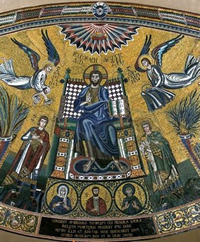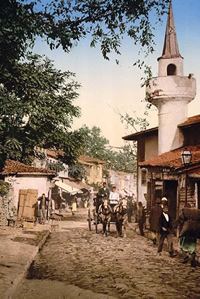Ecumenical Councils Turkey
Second Council of Constantinople (553)
During the following period while some Christian theologians sought
new formulas to bring the Monophysite East (Egypt, Syria and Palestine)
into the body of the Church, the quarrels and fights between the
Chalcedonians and the Monophysites continued. Until Justinian came to
the throne in 527 most of the Byzantine emperors were tolerant to the
Monophysites and this alienated the Western Church.

The reign of Justinian (527-65) was marked with conquests both in the
east and west. In the capital he had built the church of St. Sophia
which is still one of the oldest and greatest edifices of the Christian
world. Nor could the teaching of pagan Greek philosophy be tolerated,
except in Christian institutions. In 529 he commanded that the Platonic
Academy in Athens be closed forever. He wanted to recover the West for
which the acceptance of the Chalcedon cause was indispensable. As a
Christian Roman emperor and vice-regent of God on earth he felt duty
bound to enforce uniformity of belief on his subjects and to unite
Church and State firmly under his control.
Heresy, especially that of the Monophysites was to be stamped out.
However, dealing harshly with Egypt would harm the corn traffic to his
capital. The Monophysites were not happy with the previous Council of
Chalcedon (451) because of the fact that although it had reaffirmed the
orthodox definition it had acquitted the three major Nestorians of the
time whose works were most objectionable to the Monophysites. They asked
for another council which, as it would reassert the Chalcedonian
definition, would condemn the propositions or 'chapters' written by
these three theologians: Theodore of Mopsuestia (Misis), Theodoret of
Cyrrhus (in Syria) and Ibas of Edessa (Urfa).

The council summoned in Constantinople met in the church of St. Sophia.
Justinian stayed away from the meeting. The letters he sent to the
participants however (only two dozen of 168 participants were from the
West or Africa) told them what he hoped to hear. The meeting ended with
the expected decision and acknowledged the errors in the writings of
these three theologians and said that it was not proper to anathematize
the dead. The result failed to placate the Monophysites.
This result did not add anything new to the problems between the
Chalcedonians and Monophysites. The latter created an underground
episcopate which has lasted to the present day among the Syrian
Jacobites, Copts and Ethiopians who reject Chalcedon.
Ecumenical Councils Turkey
First Council of Nicaea
(325)
First Council of Constantinople
(381)
Council of Ephesus
(431)
Council of Chalcedon
(451)
Second Council of Constantinople
(553)
Third Council of Constantinople
(680-1)
Second Council of Nicaea
(787)


